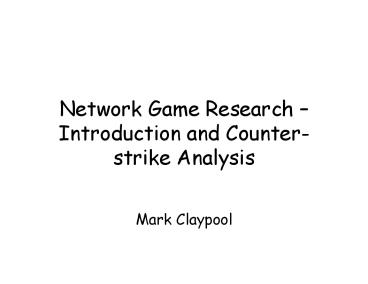Network Game Research Introduction and Counterstrike Analysis - PowerPoint PPT Presentation
Title:
Network Game Research Introduction and Counterstrike Analysis
Description:
Rapidly increasing in popularity. Forrester Research: 18 million on-line in 2001 ... Playstation 2 on-line (9/2002) Xbox Live (12/2002) Cell phones. Doom port (Nokia) ... – PowerPoint PPT presentation
Number of Views:76
Avg rating:3.0/5.0
Title: Network Game Research Introduction and Counterstrike Analysis
1
Network Game Research Introduction and
Counter-strike Analysis
- Mark Claypool
2
Outline
- Overview of Network Games
- Net Games Conference
- Research Issues
- Analysis Counter-strike
- Our Results
3
Why Study Games?
- Rapidly increasing in popularity
- Forrester Research 18 million on-line in 2001
- Consoles on-line
- Playstation 2 on-line (9/2002)
- Xbox Live (12/2002)
- Cell phones
- Doom port (Nokia)
- Design networks to better accommodate traffic
4
Game Types
- First Person Shooters
- Doom, Quake, Counter-strike,
- Massive Multi-Player Online Role Playing
- Everquest, Earth and Beyond,
- Real-Time Strategy
- Warcraft, Starcraft
- Other
- Misc not any genre above
- Example Diablo2, Racing,
- Non-networked
- Example Thief
- Multiplayer, but relaxed real time
- Example Chess, Bridge
5
Net-Games - Workshop on Network and System
Support for Games
- First was 2002 in Braunschweig, Germany
- http//wwwmc.tm.uni-karlsruhe.de/netgames2002/
- Second is in Redwood City, California
- http//confman.eecs.umich.edu/netgames2003/
- Sponsored by
- ACM
- Electronic Arts
- Microsoft
6
Net-Games Program Committee
- Sugih Jamin, University of Michigan (Chair)
- Mostafa Ammar, Georgia Institute of Technology
- Grenville Armitage, Swinburne University of
Technology - John Buchanan, Electronic Arts
- Jon Crowcroft, University of Cambridge
- Christophe Diot, Sprintlabs
- Wu-chang Feng, Oregon Health and Science
University - Carsten Griwodz, University of Oslo
- Jim Kurose, UMass at Amherst
- John Laird, University of Michigan
- Brian Neil Levine, UMass at Amherst
- Martin Mauve, University of Mannheim
- Hiroyuki Morikawa, University of Tokyo
- Dan Rubenstein, Columbia University
- Srinivasan Seshan, Carnegie Mellon University
- Wilson Yuen, City University of Hong Kong
- Lars Wolf, TU Braunschweig
7
Net-Games Topics
- Multi-player game architectures and platforms
- Prevention and detection of cheating
- Games on mobile and resource-scarce devices
- AI and techniques for latency hiding
- Modeling, usage studies, and characterization
- Enabling protocols for networked games
- Systems support for authentication and accounting
- Put research issues here
8
Provisioning On-line Games A Traffic Analysis
of a Busy Counter-Strike Server
- Wu-chang Feng, Francis Chang, Wu-chi Feng,
Jonathan Walpole
9
Goal
- Understand the resource requirements of a popular
on-line FPS (first-person shooter) game
10
Why FPS?
- While there are other game types
- Gaming traffic dominated by first-person shooter
genre (FPS) McCreary00
11
Networked FPS lineage
Doom
Unreal
Unreal Tournament
Doom II
Quake QuakeWorld variants Team Fortress
Capture the Flag
Unreal Tournament 2003 America's Army
Operations
Quake II Soldier of Fortune Heretic II
Quake III Arena Medal of Honor Allied
Assault Return to Castle Wolfenstein
Soldier of Fortune 2 Jedi Knight II
Half-Life Counter-Strike Day of Defeat
Urban Terror Team Fortress Classic Team
Fortress 2
8 of top 10 games derived from one of two lineages
Doom III
12
About the game...
- Half-Life modification
- Two squads of players competing in rounds lasting
several minutes - Rounds played on maps that are rotated over time
- Each server supports up to 32 players
13
What is Counter-strike (CS)?
14
What is Counter-strike (CS)?
15
What is Counter-strike (CS)?
16
About the game...
- Centralized server implementation
- Clients update server with actions from players
- Server maintains global information and
determines game state - Server broadcasts results to each client
- Sources of network traffic
- Real-time action and coordinate information
- Broadcast in-game text messaging
- Broadcast in-game voice messaging
- Customized spray images from players
- Customized sounds and entire maps from server
17
Why CS?
18
Why CS?
19
The Trace
- cs.mshmro.com (129.95.50.147)
- Dedicated 1.8GHz Pentium 4 Linux server
- OC-3
- 70,000 unique players (WonIDs) over last 4
months - One week in duration 4/11 4/18
- 500 million packets
- 16,000 sessions from 5800 different players
20
A week in the life...
21
Variance time plot
Less variance above 30 min
(Normalized to base interval of 10ms)
22
Digging deeper
- Periodic server bursts every 50ms
- Game must support high interactivity
- Game logic requires predictable updates to
perform lag compensation
Interval size10ms
Interval size50ms































